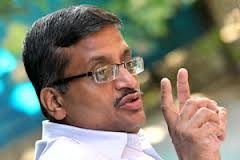
In an interview with Karan Thapar, telecast on CNN-IBN, Khemka justified his action of cancelling the mutation after he had been transferred from his post as director general (land holdings and consolidation) on Oct 11 last year.
"I relinquished charge on Oct 15 and I had all the right to function as such till Oct 15. I had the right to use those powers. If my right was not there, the DLF or Robert Vadra's company could have approached the high court with these very facts and could have obtained a moral setting aside of the order," he said.
"As long as you hold charge, you continue to do your duties. There is no personal interest here," he said.
Khemka had conveyed to the Haryana government that the whole deal done by Vadra in the purchase, getting licence and sale of prime land, measuring 2.7 acres, in Shikohpur village in Gurgaon district was based on "false" documents, including a fictitious cheque, and was a "sham sale".
The allegations were made in his reply to the Haryana government in May this year on the findings of a three-member committee of Haryana officials set up by the Bhupinder Singh Hooda government October last year on issues raised by him.
Asked by Karan Thapar if he had acted on the basis of supposition, Khmeka said there was inference of wrongdoing.
"It was not a supposition. It is a likely, possible inference with a high degree of probability," Khemka said.
Answering another query, Khemka said at his level he did have powers for requisite investigation. "Truth is to be established in criminal investigation," he said.
Khemka had said in his reply to the Haryana government that Vadra's land deal with DLF was a clear cut case of impropriety as Vadra bought the land for Rs.7.5 crore, procured a licence for a colony from the Hooda government and sold off the same land to DLF for Rs.58 crore.
He alleged that Vadra's company Sky Light Hospitality made over Rs.42.6 crore from the deal.
In his interview to Karan Thapar, Khemka, however, admitted that Sky Light Hospitality had mentioned in its agreement given to the state authorities for commercial licence that land that had been transferred to DLF five months earlier.
"The collaboration agreement signed by both Sky Light hospitality and DLF admit that possession was handed over and taken over," Khemka said.
He said that Sky Light Hospitality had given details of the land deal in the documents but they were not in the correct format.
Khemka denied that he had acted with vendetta against Vadra.
"Why should it be an act of vendetta. What did I have against the gentleman," he asked.
Asked if it was a quasi-judicial procedure and the parties should have been heard before the cancellation of mutation, Khemka said he had the authority to take the decision.
He said he had urged the state government for another inquiry.
"(About his reply) This is a comment to the state government when they were probing whether licensing aspect was correct or not. I am giving my comments to the state government that the committee deliberately omitted these facts. And please hold another inquiry and, if I am wrong, you can pillory me. But you cannot pillory me in favour of an accused," he said.
Khemka said he was certain he had done the right thing.
"Absolutely, it was the right thing to do. If you have to take action, the morality should start at the top. It is very easy to take action with people who are downtrodden but it requires courage and guts to call a bluff a bluff when it happens at the top," Khemka said.





Comments
Add new comment